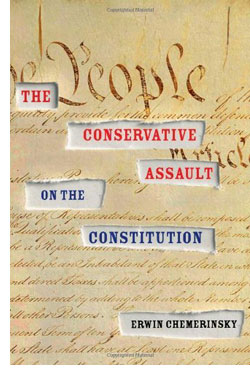 |
 |
 Erwin Chemerinsky
Erwin Chemerinsky
The Conservative Assault on the Constitution
Reviewed by: Rick Kleffel © 2010
Simon & Schuster
USA Trade Hardback, First Edition
ISBN 978-1-416-57468-2
Publication Date: 09-28-2010
326 pages, $27
Date Reviewed: 12-25-2010
Index:
Non-Fiction
Revolution takes many forms. When we hear the word spoken with regards to a government — our government, we might think that the United States itself was the result of violent, armed revolution, or that it survived one violent, armed revolution, or might yet succumb to some sort of violent, armed revolution. But revolt does not always require violence — at least not physical violence.
Rhetorical violence, however, is another matter, and Erwin Chemerinsky makes a great case for a rhetorical revolt from within in 'The Conservative Assault on the Constitution.' His premise is that starting in 1964, with the first, failed implementation of what came to be called "the Southern Strategy," ideological conservatives, most of them in the Republican Party, began an attack on the core principles of the Constitution of the United States of America, first and foremost by the conservative members of the Supreme Court. Cloaking themselves in the newspeak of "strict constructionalists," these justices asserted that they were adhering to principles that they were actually undermining to advance a conservative political agenda.
Chemerinsky knows his Supreme Court from the ground up. He begins his book with his experience defending Leandro Adrade, a nine-year Army veteran and father of three, who was convicted of stealing $153 worth of children's video tapes from Southern California K-Mart stores. Under California's three strikes law, Andrade received a sentence of life imprisonment with no possibility of parole for fifty years — a sentence upheld by the Supreme Court, as Chemerinsky lost his case.
Having established his bona fides both as a lawyer and a passionate advocate (he does lots of work pro bono), Chemerinsky then works through a straightforward legal history that examines the Supreme Court, conservative ideology and executive powers. His facts are compelling and his arguments are strong. Better still, he's a lively writer who knows how to structure a book as well as a legal argument. The two may have some similarities, but they are not the same. 'The Conservative Assault on the Constitution' is a timely look at timeless problems.
Chemerinsky 's book looks at six major areas and examines the effect of the conservative ideology on each. Generally, though not always, this means a look at Supreme Court decisions, some of them cases in which he was personally involved. After his introduction, he looks at those cases involving the school system and segregation, as it is his contention this was the first wedge driven. When he examines what he calls "the Imperial Presidency," he goes beyond the Supreme Court to examine how conservative presidents have claimed powers not intended by the forefathers, who were very leery of power concentrated in the king. Efforts to dismantle the wall separating Church and State, reduce the rights of criminal defendants, eliminate individual freedoms and close the courts themselves follow. He concludes the book with a look at the sum total of what has happened and the possibility for reclaiming the Constitution.
Chemerinsky's book is a book of well-told stories of individuals put in conflict with the United States government. He creates some memorable portraits based on his own experiences, and tells his stories well. 'The Conservative Assault on the Constitution' is certainly a well-written legal history. Chemerinsky's legal and moral arguments are well-constructed. They're backed by his documented knowledge of the Constitution — he wrote the leading textbook on Constitutional law. His personal experiences arguing cases in front of the Supreme Court and his passion for some sort of abstract justice are demonstrated by his pro-bono work and his obvious sympathy with the underdogs and downtrodden that he has represented.
Clearly, Chemerinsky's arguments are not necessarily likely to sway those at whom he aims his barbs. But as a fairly typical lower-middle class American, I'd be curious to hear just what some of the specific justices he examines would say about his book. In any event, his deep knowledge and experience bring a perspective to this history that makes it compelling reading. If you care about justice, if you are interested in recent American legal history, if you are at all worried about what seems to be an unstoppable abrogation of our individual liberties, no matter what your political persuasion, then 'The Conservative Assault on the Constitution' is a engaging way to examine our past with an eye towards changing the future.
|
 |
|
|
 |
| |
Review Archive
All Reviews alphabetized by author.
General Fiction
Non-Genre, general fiction and literature.
Horror
Supernatural fiction, supernatural horror and non-supernatural horror.
Science Fiction
Science fiction, science fantasy, speculative fiction, alternate history.
Fantasy
Fantasy, surrealism and magic realism.
Mystery
Crime, thrillers, mystery, suspense.
Non-Fiction
Non-Fiction, True Crime, Forteana, Reference.
Poetry
|
|
 |
|




